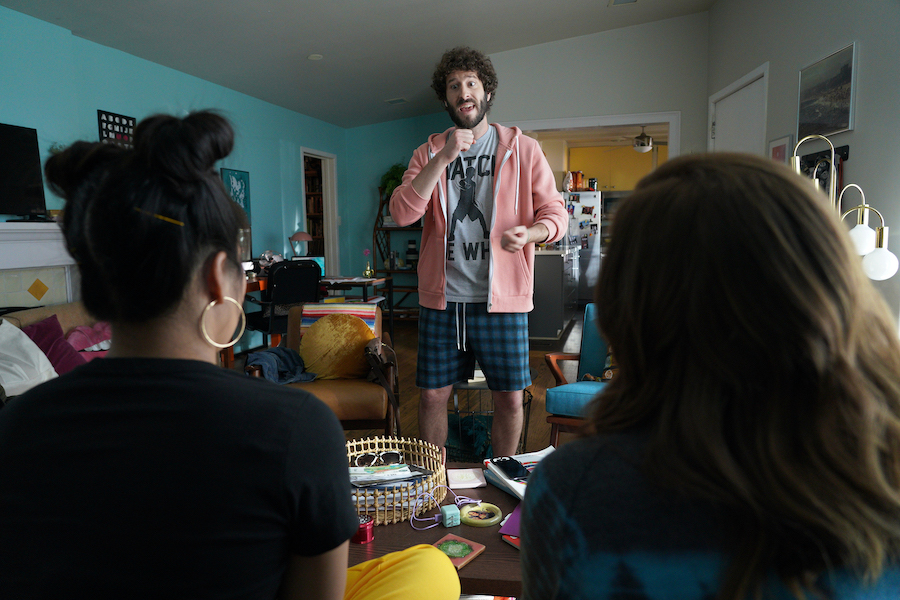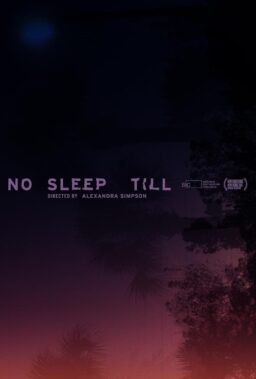Lil Dicky’s new plot for world domination starts in a doctor’s office, detailing the history of his unusual penis. As the series opener to his sometimes hilarious FX series “Dave,” this scene of the rapper (real name Dave Burd) is particularly on brand for the musician in his own droll way, who in real-life has entered into the arena of white guy rappers by selling himself as an open season of emasculation, albeit with impeccable flow. But the same dude who speaks sheepishly about his genitals is also marketing savvy, and a budding comedy writer and actor. “Dave” turns out to be a strong, episodic platform for his persona, providing that the show doesn’t stray too far from the rap skills that can turn a meme into a zeitgeist.
It’s a considerable change from Lil Dicky’s 2015 album Professional Rapper, where in between self-deprecating rhymes Lil Dicky came off as angsty against any critics and rap fans who would dare undersell him, as if they were missing out on a great business opportunity (the cover art was his resume). That part of his career showed an abrasive, self-aware ego who wanted to push buttons about not having the struggles of his idols. If you want to give him another shot, Lil Dicky doesn’t redact his awful Chris Brown collaboration (“Freaky Friday”), but he does fine-tune his persona into a funny slacker who has a musical gift, who stays in his lyrical lane, and has dreams of being the greatest. Sometimes that idea of being “the greatest” simply feels like the desire of having the largest audience possible, but Burd makes you want to tune in because his character, with his puppy eyes and framed Drake poster above his bed, feels like he’s on the verge something big.

This version of Lil Dicky is more low-key, a man-child from the Judd Apatow Family Tree who never was (fitting, then, that Greg Mottola of Apatow productions “Freaks and Geeks” and” Superbad” gets the series off the ground with its peppiest episodes). As Dave, Lil Dicky is somewhat soft-spoken in a world that’s populated by far less neurotic personalities, like when he is star-struck by rapper YG in the pilot (and tries to use his Bar Mitzvah money to get a YG collaboration). He’s an outsider with a skill and charisma that gets people to take him seriously, which is how he meets his friend GaTa (GaTa) in the pilot, and Dicky’s sometimes cluelessness in how to interact with other rappers comes off as genuine, based more in an awkward, naive camera presence than treacly racial subtext. The show has a funny relationship with Dicky too: when he raps in the pilot’s climax, the camera stands back and is in a little awe. But just as much, “Dave” can abruptly cut away from his neurotic ramblings (as in the pilot’s last moments) as if it too thinks that at the end of the day, he’s still a dork.
“Dave” is largely character-based, but it’s only as good as its scenarios, as applied from his dynamic situation of being a slacker rapper. This chemical balance makes episode two the series’ funniest, in which Dicky has to perform his first concert under hilariously dark circumstances, and is shown lyrics that seem thematically impossible. The execution is so tonally nuanced and ridiculous that you can easily look past confusion why Lil Dicky would have never performed before, and it’s a strong example of when hanging out with Dave and his friends can be fruitful and not forced.

The third episode is also great, focusing on how Lil Dicky’s braggadocious, sexual lyrics don’t translate to Dave when he’s with his girlfriend Ally (Taylor Mislak) in the bedroom. While Mislak and Burd share numerous funny scenes throughout the series, it’s one of the best examples of how his music affects their chemistry, and yet they try to work together. It’s a unique quandary for a premise that would make for a standout episode in Joe Swanberg’s bite-size romance anthology “Easy,” and it’s done with a sweetness that “Dave” engineers through its own charm.
But Dave is a slacker at heart, who is just as likely to sit in front of a TV than work hard on making his next hit. That very lack of action seems to affect the writing itself, as the show spins its wheels with Dicky’s potential in episode four (despite a bunch of cameos), and five (despite giving GaTa his own backstory). TV success is on the horizon for Burd, providing that the show’s writing—not just his rap skills—can get him there.
Five episodes screened for review.












